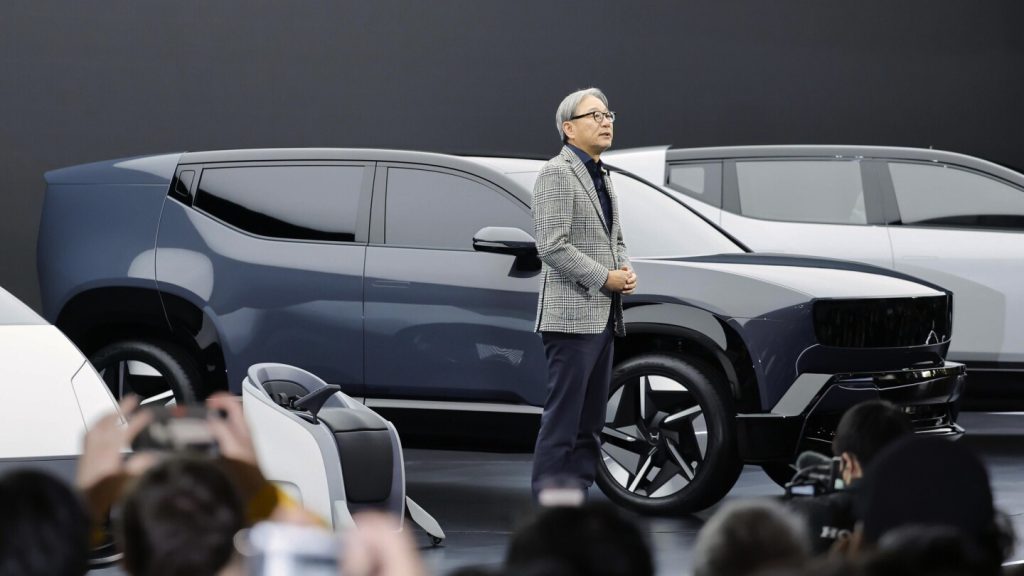Listen to the article
Honda’s Profit Falls 37% as Trump Tariffs and Supply Chain Issues Take Toll
Honda Motor Co. reported a significant decline in profit for the first half of its fiscal year, with earnings dropping 37% compared to the same period last year. The Japanese automaker’s financial performance has been heavily impacted by U.S. tariffs imposed under President Donald Trump’s administration, despite strong motorcycle sales across global markets.
The Tokyo-based company posted a profit of 311.8 billion yen ($2 billion) for the April-September period, down from 494.6 billion yen a year earlier. Sales decreased 1.5% to 10.6 trillion yen ($69 billion) from nearly 10.8 trillion yen in the previous year.
In response to these challenges, Honda has revised its full-year profit forecast downward. The company now expects to earn 300 billion yen ($2 billion) for the fiscal year ending March 2026, representing a substantial 64% decline from the 835.8 billion yen recorded the previous year. This new projection is significantly lower than its earlier forecast of 420 billion yen ($2.7 billion).
Currency fluctuations have compounded Honda’s financial difficulties, with unfavorable exchange rates erasing 116 billion yen ($756 million) from its operating profit during the six-month period. However, the most substantial impact came from tariffs, which caused a decline of 164 billion yen ($1.1 billion) in operating profit over the same timeframe, according to company statements.
Despite these headwinds, Honda’s motorcycle division has performed exceptionally well. The company achieved record motorcycle sales globally, driven primarily by strong results in Asia (excluding Vietnam), where it sold more than 9 million motorcycles during the first half, up from 8.8 million a year ago. Worldwide, Honda’s motorcycle sales reached a record 10.7 million units, with growth in all regions except Europe.
In contrast, Honda’s global vehicle sales have struggled, totaling 1.68 million units in the first half, down from 1.78 million in the same period last year. While North American vehicle sales showed growth, the company experienced declines in Japan, the rest of Asia, and Europe. Honda, known for models like the Accord sedan and Odyssey minivan, continues to navigate a challenging automotive market environment.
The automaker’s production capabilities have been further strained by recent semiconductor supply chain disruptions. In late September, the Dutch government took control of chipmaker Nexperia, citing national security concerns. Although Nexperia is based in the Netherlands, it is owned by Chinese company Wingtech Technology. In response, China temporarily blocked chip shipments from Nexperia’s plant in Dongguan, though these exports have since resumed.
These disruptions have directly impacted Honda’s North American operations. The company’s plant in Celaya, Mexico, has been halted since October 28, and production at other North American facilities has been adjusted since October 27 due to supply issues related to the Nexperia situation. Honda has not provided a timeline for when production will return to normal levels.
Despite these challenges, Honda’s stock showed resilience, gaining 1.8% to 1,585 yen ($10) in Tokyo trading on Friday.
The company’s current predicament highlights the vulnerability of global automotive supply chains to trade tensions and semiconductor shortages, challenges that have affected much of the industry in recent years. While Honda’s motorcycle division demonstrates strength, its automotive segment continues to face significant headwinds from both policy decisions and supply chain disruptions.
Fact Checker
Verify the accuracy of this article using The Disinformation Commission analysis and real-time sources.




7 Comments
It’s unfortunate to see the impact of tariffs on Japanese automakers like Honda. Their profit decline is a reminder of the complex global supply chains and how trade policies can ripple through industries.
Currency fluctuations compounding the tariff impacts – that’s a double whammy for Honda. Automakers will need to carefully manage their exposure to exchange rate volatility to protect profitability.
The automakers are facing a challenging environment with tariffs, supply chain issues, and currency fluctuations. It will be interesting to see how they adapt and respond to these headwinds going forward.
The decline in Honda’s sales and profit is concerning, but not surprising given the trade tensions. Automakers will need to find creative ways to offset these headwinds and remain competitive.
Honda’s situation underscores the importance of global trade relationships and stable policy environments for multinational corporations. Navigating these complexities will be critical for their long-term success.
It’s a tough time for the auto industry, with Honda’s results highlighting the broader challenges. Companies will need to be nimble and innovative to navigate these headwinds.
Honda’s revised profit forecast highlights the need for companies to be agile and responsive to changing market conditions. Diversifying supply chains and optimizing operations could help mitigate the impact of external factors.